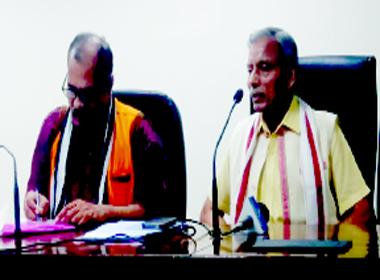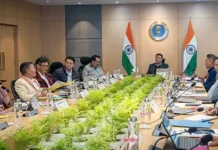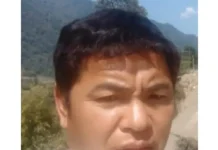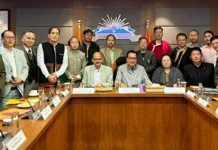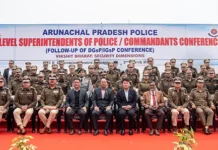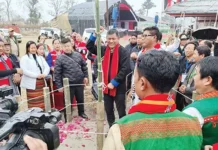Staff Reporter
ITANAGAR, Jul 16: Chief Commissioner for Persons with Disabilities (PwD) Dr Kamlesh Kumar Pandey along with Deputy Chief Commissioner Rakesh Kumar Rao arrived here on Monday to review Arunachal Pradesh’ status in implementing the schemes meant for PwDs, and noted that the state’s grievance redressal system needs the most attention.
“Disability is a state subject, and the state has to fulfill all the work according to the model provided by the central government, considering the state’s need, region and resources,” Pandey said.
Earlier, Dr Pandey and Roy held a meeting with Chief Secretary Satya Gopal and highlighted that the state has neither a full-fledged commissioner nor independent officers to deal with the issues of PwDs.
It was also found that even the health secretary and the health commissioner have additional charges assigned to them, making it difficult for them to deal with the components of disability.
Dr Pandey suggested assigning a district disability officer to each district of the state, and to create awareness among the public as well as among those in power.
While he commended the provision of disability pension of Rs 1000 to Rs 2000 per month by the Arunachal Pradesh government – which is the highest disability pension
in the Northeast region – Dr Pandey said mere pension would not help the PwDs sustain a proper livelihood, and called for providing them with vocational training classes to make them self-sufficient.
The duo noted that there was lack of proper monitoring, and lack of regular reviews of the districts and the department.
Dr Pandey also asked the state government to implement the GHARAUNDA (Group Home and Rehabilitation Activities under The National Trust Act for Disabled Adults) scheme, which is a lifelong shelter scheme for physically as well as well as intellectually disabled persons.
Stating that a special educator is a must in all the schools, Dr Pandey said, “The concept of special schools is outdated, and now students with disabilities will be admitted to regular schools. But for this, schools will require special educators, and there is need to set up a special educator training institute.”
He noted that, while the government was unable to provide the exact number of special educators in the state, there are only a handful of NGOs working in the disability sector.
“The government of India has reserved 25 percent of its budget for the Northeast region, but we lack agencies to utilize them in a proper manner, and that system has to be set up as well,” Dr Pandey said.
“There are currently over 33, 300 persons with disabilities in the state and they are not able to avail the benefits of the government of India as they lack the unique disability identification (UDID) cards. We have received reports of only nine districts where 2504 persons with disabilities have been provided with certificates,” he informed.
Currently, only six UDID cards have been generated by Arunachal Pradesh.
“Several sections require attention of the state government, but Arunachal is faring considerably better than the rest of the Northeast states in implementing the schemes for the disabled,” Dr Pandey said.
Meanwhile, the chief secretary has assured to look into the issues highlighted by Dr Pandey, and has issued directions to the officials concerned to take necessary action.
“He (the CS) also assured to open vocational training institutes for PwDs,” informed Dr Pandey.
Earlier, Dr Pandey and Roy also met with a few NGOs working for and with disabled persons.
Under the Rights of Persons with Disability Act 2016, the commissioner’s office has to monitor the fund dispersed by the central government in the field of disability through agencies or NGOs; review the status of implementation of the act in states; provide redress to grievances; and prepare annual report and put it on the floor of the party elected.

